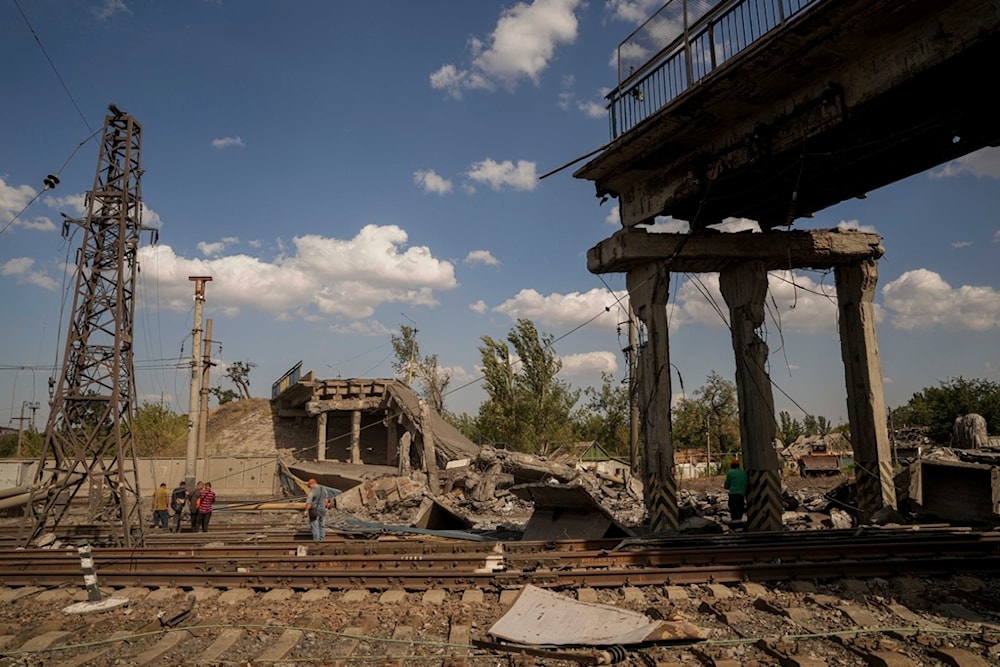West discreetly discussing negotiated Ukraine peace as setbacks mount
As Russian forces advance in Donbass and Western support for Ukraine faces new limitations, Le Figaro reports that a negotiated peace solution is being quietly discussed among Ukraine’s allies.
-

Railway workers look on the bridge destroyed by a Russian airstrike in Pokrovsk, Ukraine, September 17, 2024. (AP)
Le Figaro reported that Kiev’s setbacks are leading Western backers to reconsider how to resolve the Russia-Ukraine conflict. After 30 months of fighting, the idea of a negotiated settlement is being "discreetly" discussed in the US, EU, and even Ukraine, the French newspaper said on Monday.
The paper wrote that Russian forces are advancing “slowly but steadily” in Donbass, nearing the strategic town of Pokrovsk. Le Figaro notes that “in the West, it is increasingly openly acknowledged that Donbass and Crimea are beyond the military reach of the Ukrainians.”
Although Kiev’s incursion into Russia’s Kursk Region may have met its political goals, it did not prompt Moscow to withdraw forces from other areas of the frontline, the newspaper stressed.
The article notes that Washington is blocking Kiev from conducting long-range strikes into Russian territory due to fears of escalating tensions with Moscow, including the risk of nuclear conflict. An unnamed French official told Le Figaro that "Whoever the US president is [after the election in November], the aid will decrease and the war will not be sustainable for the Ukrainians."
Germany recently cut military aid to Ukraine, and France “lost the initiative” after President Emmanuel Macron dissolved parliament in June. Additionally, the West “misjudged” Russia’s strong ties with allies in the Global South and Asia, including China, Iran, and the Democratic People's Republic of Korea, the paper added.
Moreover, a senior French diplomat told Le Figaro that Paris is now advocating for a "lasting and negotiated solution to the war, with Ukraine in a position of strength to assert its rights and security against Russia."
The outlet noted that a new "peace summit" on Ukraine could now take place in Abu Dhabi after the US elections in November, following an unsuccessful gathering in Switzerland this summer.
A French official emphasized that the West must decide "what could be considered a victory for Ukraine," asking whether it should be a "territorial victory" to reclaim allegedly regions now under Russia's control or a "political victory" under the notion of "a free and democratic country, turned towards the West, engaged in the EU and NATO, even if it means giving up, temporarily, the occupied territories?"
EU prepares €40Bln loan for Ukraine without US involvement: FT
The Financial Times reported on Tuesday that the EU is preparing to provide up to €40 billion in new loans to Ukraine by the end of the year, moving forward without US participation.
This decision comes after a G7 plan to use frozen Russian assets to aid Ukraine faltered due to opposition from Hungary, led by Prime Minister Viktor Orbán.
The EU is concerned that Hungary may block the delivery of key safeguards needed for the US to join the frozen asset scheme, prompting Brussels to consider an alternative, unilateral approach.
The new funding aims to support Ukraine's financial stability as it faces a projected $38 billion financing gap in 2025, according to Kiev and the International Monetary Fund (IMF).
The EU's proposal would bypass Hungary's veto by raising funds through an existing aid program that only requires majority support from member states, rather than unanimity.
While the original plan, which involved US participation, remains the EU's preferred option, officials are preparing to act alone if Hungary maintains its veto until after the US presidential election in November.
G7 leaders had agreed to provide a $50 billion loan to Ukraine, with the EU and U.S. each contributing $20 billion.
However, the US requires assurances that the frozen Russian assets, mainly held in Europe, will remain secured for future loan repayments.
The EU is now racing to finalize the proposal before the end of the year, as the current financial support package for Ukraine is set to expire.
The plan would include proceeds from frozen Russian assets, which generate approximately €2.5 to €3 billion annually, to help repay the loan.
Brussels hopes that Washington will still contribute, but the EU is prepared to act independently if needed.
Read more: Putin orders increase in size of Russian military

 4 Min Read
4 Min Read









